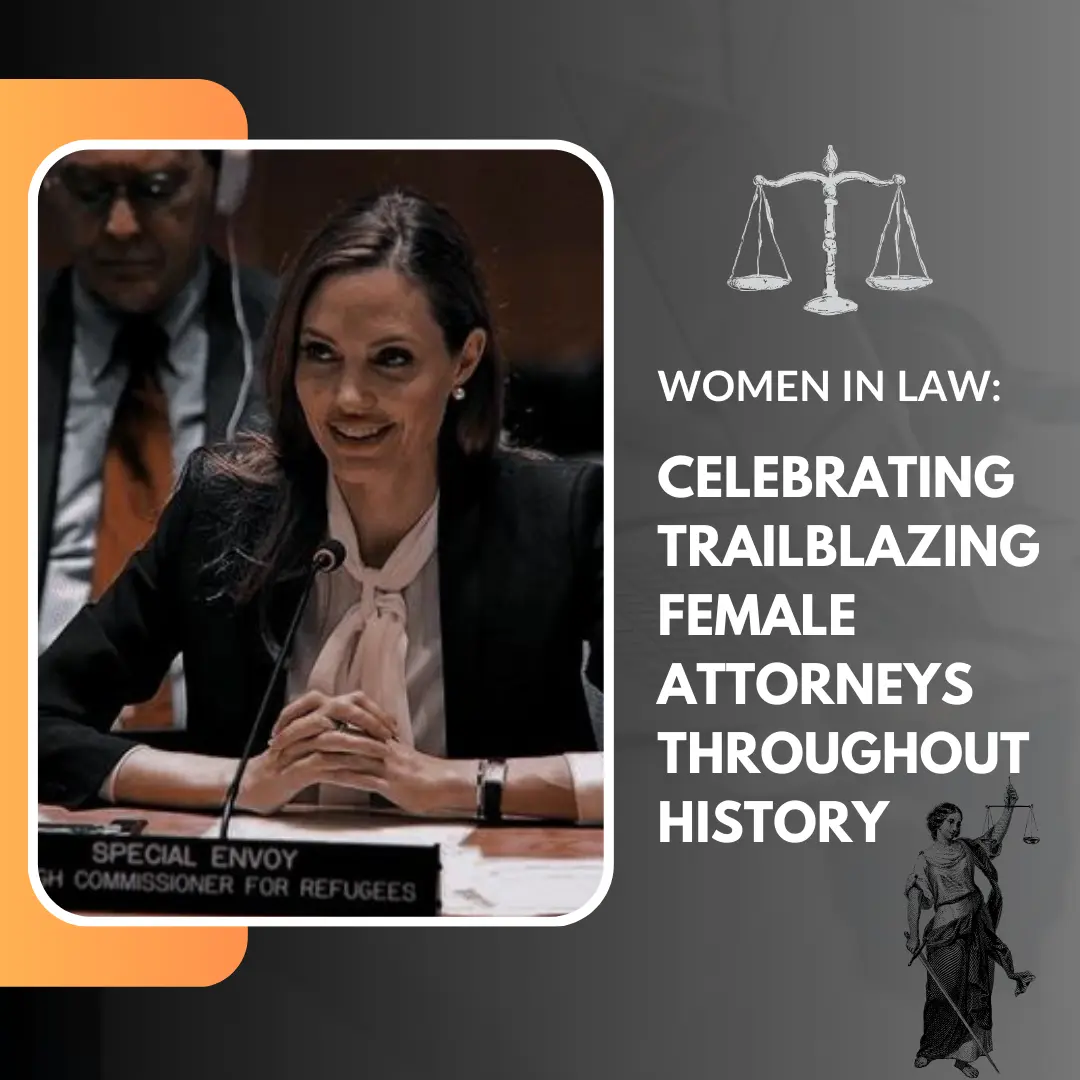Introduction
Law has always favored men, limiting women’s progress. Many women have changed the law by breaking down barriers, battling for justice, and encouraging future generations despite these obstacles. Female solicitors who pioneered legal gender equality are honored. The journey of female attorneys is one of resilience and determination, showcasing the power of women in law to inspire and lead.
Early Pioneers
Myra Bradwell: Legal Recognition Battle
Myra Bradwell was born in 1831 when women were expected to remain domestic. Bradwell believed in women despite these limits. She sought a male-dominated law job.
Issues with bar admission
Bradwell applied to the Illinois bar in 1869, confident in her law skills. Her gender application failed. The Illinois Supreme Court noted the era’s widespread gender discrimination. Bradwell petitioned the USSC.
The US Supreme Court decision Bradwell v. Illinois advanced legal gender equality. Though the U.S. The Supreme Court affirmed the Illinois Supreme Court’s verdict, promoting women’s rights. A famous judge declared “The paramount destiny and mission of woman are to fulfill the noble and benign offices of wife and mother.”
Contributions to Legal Reform
Myra Bradwell advocated for gender equality following her court loss. The Chicago Legal News was her 1868 journalism. Bradwell promoted women’s rights and legal reform as editor. She shaped public opinion and laws allowing women lawyers.
Honor and Tradition
Bradwell’s judgment changed the law forever. 24 years after applying, she joined the Illinois bar in 1890. Myra Bradwell shows how persistence and advocacy may overcome prejudice. She demonstrated to future women lawyers that justice and perseverance can overcome obstacles.
Belva Lockwood: Supreme Court breakthrough
Early Challenges and Education
Belva Lockwood, born in 1830, wanted to be a lawyer. Women were forbidden from college, but Lockwood wanted to pursue law. She graduated from National University Law School in Washington, D.C., after being twice denied entrance due to her gender.
Advocate and bar admission Lockwood resumed his path after law school. Her bar entrance application faces more opposition. She became the first American woman lawyer in 1879 after campaigning. Supreme Court. This was a personal and legal milestone for all women.
Rights Movement for Women
Belva Lockwood’s law talents advanced women’s rights. Recognizing legal and political rights, she advocated for women’s suffrage. Famous suffragettes like Lockwood campaigned for voting rights.
Presidential candidate Lockwood pioneered beyond the courtroom. A National Equal Rights Party presidential candidate in 1884 and 1888. Though she lost, her campaign was remarkable and expanded women’s political representation. Lockwood showed women could be president.
Enduring Impact and Legacy
Law and beyond were affected by Belva Lockwood’s persistence. She went to America. Many women benefited from the Supreme Court bar. Lockwood’s presidential campaign and politics influenced female equality supporters. Her life and work demonstrate how one person may change society.
Early 20th-century progress
California’s first female lawyer: Clara Foltz
Female rights activist Clara Shortridge Foltz, California’s first female lawyer, was born in 1849. She initiated California’s “Woman Lawyer’s Bill,” permitting women to practice law. Foltz championed public defense counsel for accused defendants. The law honors her gender equality campaign.
Race and gender boundaries breached by Charlotte E. Ray
The first African American woman to graduate from law school was 1850-born Charlotte E. Ray. The Howard University School of Law graduate joined the DC bar in 1872. Ray founded a business legal firm to fight racism and misogyny. Her determination inspired African American women attorneys.
Opportunities Increase The mid-20th century was diverse. Trailblazer Pauli Murray is a lawyer, civil rights and gender equality campaigner. Born 1910: Pauli Murray. The first black Yale Law School graduate. J.S.D. Murray’s law and activism impacted women’s and civil rights. She co-founded NOW and included sex discrimination in the 1964 Civil Rights Act Title VII. Lawyers and campaigners like Murray’s interdisciplinary civil rights and gender equality approach.
Ruth Bader Ginsburg: Supreme Legacy
Famous lawyer Ruth Bader Ginsburg was born in 1933. Columbia Law School graduate Ginsburg suffered early gender prejudice. Despite these obstacles, she co-founded the ACLU’s Women’s Rights Project and became a feminist icon. US Ginsburg’s 1993 appointment. She served 27 years on the Supreme Court. Her legal opinions on gender equality, reproductive rights, and civil freedoms shaped American law.
Modern Era: Legacy Continued
Sandra Day First female Supreme Court justice O’Connor
1930-born 1981 Sandra Day The first female Supreme Court justice was O’Connor. Reagan often picked O’Connor as a swing vote. Many political factions praised her pragmatic and balanced legal approach. O’Connor’s Supreme Court tenure expanded women’s rights.
Diversity & Inclusion Advocate Sonia Sotomayor
Born 1954, in 2009 Sonia Sotomayor was the first Latina Supreme Court justice. Sotomayor’s personal biography and Obama nomination give the Court a fresh perspective. Her support for judicial and social diversity. Sotomayor’s remarks emphasize empathy, equality, and justice, demonstrating her devotion.
Global Perspectives: Pioneers
Shirin Ebadi: Iran Human Rights Advocate Early and Legal Career
Shirin Ebadi was born 1947 Hamadan, Iran. She grew up wanting justice and to change her nation. After earning a legal degree from Tehran University, she ascended swiftly in Iranian court. In patriarchal Iran, she became the first female judge in 1975.
Revolution and Setbacks
Women’s lives changed greatly during the 1979 Iranian Revolution. Ebadi and all other female judges were fired because the new regime understood Islamic law to forbid women from ruling. Ebadi’s failure strengthened her justice fight. Human rights were her specialty as a legal assistant and lawyer in 1992.
In 2001, Ebadi co-founded the Iranian Defenders of Human Rights Centre (DHRC) to provide legal aid to marginalized women and children. Many saw optimism in the DHRC despite Iranian restrictions. Ebadi’s DHRC work exposed Iran’s systematic injustices and political prisoners’ and disadvantaged people’s destinies. As female attorneys, they not only fight for justice but also serve as a beacon of empowerment for aspiring women in the legal field.
International Honours, Nobel Peace Prize
The first Muslim woman to win the Nobel Peace Prize was Shirin Ebadi in 2003. The Nobel Committee honored her for defending Iranian women and children. This award recognized Ebadi’s dedication and Iran’s human rights atrocities.
Persecution, Exile
Despite her international fame, Ebadi was punished by Iran. It was common to threaten her, raid her offices, and imprison coworkers. Family threats had Ebadi exiled in 2009. Outside protests against Iran’s human rights abuses.
Human Rights Fight Continues
Shirin Ebadi advocates human rights worldwide. Her Iranian justice fights were documented in several books and writings. Her relentless pursuit of legislative reform and human rights inspires campaigners worldwide. I admire Ebadi’s perseverance against injustice.
Fatou Bensouda: International Justice Leader Childhood and Education
Bensouda was born in 1961 in Gambia. Her legal and justice concerns grew early. Ife University awarded her a BA in law. The International Maritime Law Institute in Malta taught Bensouda maritime law.
Career in Gambia
Bensouda began her career as Gambia’s Solicitor General and Secretary. Her Gambian legal career supported law and justice. She reformed and administered justice in The Gambia as Attorney General and Minister of Justice. Her skill and tenacity in the courtroom proved that being female attorneys are not just about breaking barriers, but about setting new standards of excellence in the legal profession.
Transition to International Law
Benjaminsouda joined the ICC in 2004 as a Senior Legal Advisor and later Prosecutor’s Office Legal Advisory Unit Head. The ICC immediately liked her international legal skills. First African lady The ICC Chief Prosecutor was appointed in 2012.
As ICC Chief Prosecutor, Bensouda played a vital role in pursuing war crimes, genocide, and crimes against humanity. She worked on high-profile ICC trials against political and military leaders for human rights abuses. Bensouda stressed international justice and the ICC’s battle against global injustices.
Challenges and Success
Bensouda struggled. She faced political pressure from ICC-investigated governments and leaders. She campaigned for victim rights and impartial justice despite these obstacles.
Legacy and Impact
Justice and international law are Fatou Bensouda’s ICC legacy. Her efforts boosted international criminal justice and ICC global security prosecutions. Bensouda inspires attorneys and human rights campaigners.
Continuing Effect
International law remained relevant for Bensouda following her Chief Prosecutorship. Law and justice are her worldwide causes. Her work shows how dedicated people may promote global justice and accountability.
The Future of Women Lawyers Legal Education Innovation
Women advance in law as students and teachers. Law schools worldwide hire and promote women professors. Mentorship and scholarships for women in law promote equality.
Promote Legal Gender Equality
Despite improvements, female attorneys encounter gender prejudice, work-life balance, and leadership issues. NAWL and IBA are researching, advocating, and proposing solutions. Legal gender equality needs diversity and inclusion in law firms, courts, and bodies.
Inspiration for Youth
Pioneering female attorneys encourage young women to become lawyers. Role models, mentorship, and activities to motivate girls and young women to become attorneys are needed. Celebrating women attorneys and supporting aspiring lawyers promotes growth.
Conclusion
Female attorneys are fair and resilient. From Myra Bradwell and Belva Lockwood to Ruth Bader Ginsburg and Sonia Sotomayor, women have shaped law and society. As we honor these pioneering female solicitors, we must encourage gender equality and help future women solicitors. These great women remind us that the battle for justice and equality continues and that every step promotes a more inclusive and fair judicial system.

